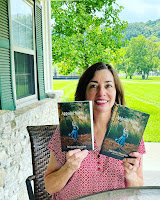Midwives take center stage in my new historical novel Appalachian Song. Because I didn't know a lot about midwives in Appalachia, I thoroughly enjoyed my research into the topic. I thought I'd share some of it with you!
First, a little background information.
 |
Great Smoky Mountains; photo from Wikipedia; Appalachian Centrist |
The Appalachian mountain range begins in Canada and runs all the way down to Alabama, connecting countries and states alike. There are various regions within Appalachia, with different customs, foods, and even their own way to pronounce the name of their beloved mountains. Because I set Appalachian Song in the mountains of East Tennessee, the correct pronunciation for that area is: Apple-at-chin and Apple-at-cha.
 |
| Mary Carson Breckenridge; public domain |
In my novel, Bertie is a midwife for her community. Like most mountain midwives, she was trained in midwifery by her mother, who was trained by her mother, thus earning the name "granny woman." Herbs, tinctures, teas, and time-honored practices were relied upon to help bring a healthy baby into the world. However, infant and mother mortality rates were--and still are--incredibly high in Appalachia.
Mary is quoted as saying, "Maternity is the young woman's battlefield. It is more dangerous, more painful, more mutilating than war, and as inexorable as all the laws of God."
Mary's contribution to rural Kentucky's mothers and children were significant. She is credited with building the first modern comprehensive health care system in the United States that focused on all aspects of a patient's wellbeing and provided programs for nursing care and midwifery. She continued to lead the Frontier Nursing Service until her death in May 1965. By that time, Frontier Nursing Service had treated nearly 58,000 patients and delivered over 14,500 babies, with only 11 maternal deaths. In 1998, a US stamp was printed in her honor.
Mary's contribution to rural Kentucky's mothers and children were significant. She is credited with building the first modern comprehensive health care system in the United States that focused on all aspects of a patient's wellbeing and provided programs for nursing care and midwifery. She continued to lead the Frontier Nursing Service until her death in May 1965. By that time, Frontier Nursing Service had treated nearly 58,000 patients and delivered over 14,500 babies, with only 11 maternal deaths. In 1998, a US stamp was printed in her honor.
By the 1970s, midwives in the United States were required to obtain formal training and certifications before they could legally practice. While many mountain people ignored such regulations, the use of "granny women" began to decline.
 |
| The Mary Breckenridge stamp |
As the mother of two sons, I'm grateful for the hospital staff that surrounded me each time I gave birth. But midwifery is on the rise these days, with many young mothers choosing to deliver their babies at home with the help of a midwife. As Bertie says in the book, the ultimate goal is a healthy baby and mama, no matter if you're in a hospital or tucked into your own bed at home.
Your turn: have you ever known anyone who had a midwife attend the birth of their baby?
Michelle Shocklee is the author of several historical novels, including Count the Nights by Stars, winner of the 2023 Christianity Today Book Award, and Under the Tulip Tree, a Christy Awards and Selah Awards finalist. Her work has been included in numerous Chicken Soup for the Soul books, magazines, and blogs. Married to her college sweetheart and the mother of two grown sons, she makes her home in Tennessee, not far from the historical sites she writes about. Michelle's next novel, Appalachian Song, releases October 3, 2023, and is available for preorder. Visit her online at www.MichelleShocklee.com
APPALACHIAN SONG
Forever within the memories of my heart.
Always remember, you are perfectly loved.
Bertie Jenkins has spent forty years serving as a midwife for her community in the Great Smoky Mountains of East Tennessee. Out of all the mothers she’s tended, none affects her more than the young teenager who shows up on her doorstep, injured, afraid, and expecting, one warm June day in 1943. As Bertie and her four sisters tenderly nurture Songbird back to health, the bond between the childless midwife and the motherless teen grows strong. But soon Songbird is forced to make a heartbreaking decision that will tear this little family apart.
Thirty years later, the day after his father’s funeral, Walker Wylie is stunned to learn he was adopted as an infant. The famous country singer enlists the help of adoption advocate Reese Chandler in the hopes of learning why he was abandoned by his birth parents. With the only clue he has in hand, Walker and Reese head deep into the Appalachian Mountains to track down Bertie Jenkins, the midwife who holds the secrets to Walker’s past.
https://www.tyndale.com/p/appalachian-song/9781496472441




Hello Michelle, Yes, my nephew's wife used a midwife for their first son's birth. This is an interesting post, as my paternal great, great-grandmother was a midwife. I learned that information from her obituary that gave a nice compliment to her life's accomplishment. Congratulations on your latest book!
ReplyDeleteWe have Amish families in our rural Kentucky community who have their own midwife. She is Amish but she is often helped by one of my church friends.
ReplyDeleteThank you for posting today. I do know many women who have had midwives attend their births. Mary Breckenridge had such a vision, many women and babies must owe her their lives. Your book sounds wonderful.
ReplyDeleteI received my copy of this book last week, and look forward to reading it soon!
ReplyDelete